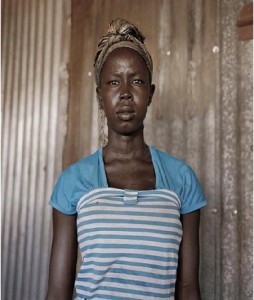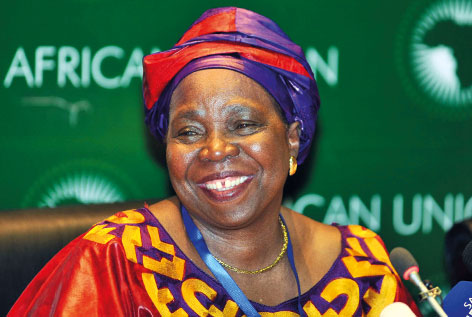
Kofi Annan

Mbeki

Obasanjo
This feature has been reproduced from the online version of Los Angeles Times, (July 29th, 2016). Media activists would surely frown at it on the ground of negativism in reporting Africa, gender activists will be up in arms using the story as a justified basis for street action while the global governance gaze would ask if the global human rights regime is even the proper realm for handling this sort of possibility. From whichever position one looks at it, it seems the world is still too far from the violent reality experienced by those on the line of fire. Yes, that is the better phrase than to call them victims because, in spite of everything, we see unbelievable capacity for resistance. This is, therefore, not food for thought but food for symbolic intervention in every little corner around the world, considering that South Sudan crisis is as local as it is global. Read on! -Editor
Child brides sold for cows: The price of being a girl in South Sudan

Lucia Poni, 23, stands with her youngest child outside her home in Terekeka. Lucia’s husband paid 10 cows to her father as a dowry. (Sara Hylton / For The Times)
By Robyn Dixon
When the girl was 16, her uncle told her he was taking her to the family village. Excited about the trip, she packed the few things she had. She thought the plan was to meet relatives and see the birthplace of her father, who died when she was 10. She didn’t understand yet that in South Sudan, being “taken to village” has another meaning: She would be married off, against her will, to an elderly man she had never met. She would be the newest of his six wives.
“My uncle needed cows,” she explained. In many communities here in one of the world’s poorest nations, daughters grow up with a single purpose: to be sold into marriage for cows to expand a family’s herd — the closest thing most people have to a bank account — and to buy wives for her brothers. Because it makes financial sense to marry off a daughter quickly, the brides are often children.
Independence for South Sudan in 2011 brought widespread hopes for prosperity, an end to years of civil war and rudimentary rights for the new country’s 11.3 million people. But little of that has materialized. A wave of killings and sexual assaults has accompanied a new outbreak of fighting, and much of the nation remains trapped in deep poverty. Though South Sudan’s assembly even before independence passed a law in 2008 limiting the marriage age to 18 and over, it is rarely enforced, particularly in rural areas. Across much of the troubled country, young girls remain as much a commodity for marriage as they ever were.
Roughly 17% of girls marry before they are 15, and nearly a quarter marry between 15 and 17, according to the government’s last survey in 2010. The vast majority of those marriages are thought to be families trading their daughters for cows. The bride price is typically 20 to 40 cows, each worth up to $500. A girl who is seen as beautiful, fertile and of high social rank can bring as many as 200 cows.
The United Nations, which says the country has the world’s fifth highest prevalence of child marriage, has attacked the practice as a violation of human rights, a serious impediment to literacy and a major cause of persistent poverty. But attempts to wipe it out have faltered because under customary law here and elsewhere in Africa, women have fewer rights than men. The eight-year-old marriage law is resisted in many communities because it demands that impoverished rural families put at risk their biggest potential commodity: their daughters.
Once a girl is taken to village, there is no way back. Schools empty. Friends and sisters are suddenly gone. Some remain, kicking the dusty path to school, dreams still singing in their heads. Some girls go meekly, melting away to a distant village to haul water and firewood, sweep, clean, wash, cook, give birth, work a lifetime.
Not Agnes Keji.

“He slashed me, and he cut my throat,” Agnes Keji said of her brother after she refused to be married off to a 70-year-old man. (Sara Hylton / For The Times)
When her father informed her that she would be married off to a man who was about 70, she explained, “I refused.” She had fallen in love with another man when she was 13 — but the romance was unthinkable because he had no cows. “If you want to kill me, kill me now because I don’t want to go to a man I don’t know,” she said she told her father.
So he beat her. Her brother did worse: He needed the cows she would bring so he could marry the girl he wanted. So he took his machete, Keji said, and found her in the village square. “He slashed me, and he cut my throat,” she said. “The cut was deep, and I was taken to hospital.” Neither her brother nor father could be reached for an interview. The left side of her neck bears a scar about an inch long. Keji tried running away to the capital of Juba, 53 miles and a three-hour drive on cratered dirt roads from her town of Terekeka on the Nile River. But her brother caught her and brought her back, she said. Now 19, she was expecting to soon be married to the older man: “I don’t have power. I’m finished. There’s nowhere to go. There’s nothing I can do.”
To understand how women are valued here, consider the story of a 12-year-old girl killed by a hippo in a swamp a few years back. Thomas Buom, a 40-year-old canoe operator in the eastern town of Nyal, came upon the scene two hours after the attack. “We were shocked, and we couldn’t even talk,” he recalled.
The tragedy of her death, however, wasn’t the mere fact that a young girl had died. It was a sad situation, Buom explained, “because we lost that girl who would have been married off for cattle just three years later.” The price of a daughter in cows is determined in a negotiation between her father and would-be husband. Many daughters are married off to elderly suitors because those men tend to have the most cows.
Once girls are married, they are expected to work and bear many children, especially daughters, who are seen as assets to acquire more cattle. They obey their husbands or face violence. Iklas Anur watched her older sister, Sumaya, suffer in an unhappy marriage after being sent to village. She recounted the story under a shady tree in Terekeka as chickens and naked toddlers wandered in the dirt. Sumaya begged her father not to marry her off to an old man who had come calling. But the man had offered 30 cows, leaving her no say in the matter. “My mother didn’t say anything, but you could tell from her face how unhappy she was,” Anur said. “But she had no voice. As a woman, there was nothing she could do. She just looked so tired and weary.”
Sumaya fled back to her family, which promptly returned her to her husband. “The cows can’t be given back,” Anur said. “It’s quite impossible.” Determined to avoid her sister’s fate, Anur discovered a way to work within the system and found a man she liked who could pay 12 cows — enough to satisfy her father. At 23, she still wishes she could have finished school instead of marrying. She knows she faces a lifetime of hard work.
Iklas Anur, 23, found a man she liked who could pay her father 12 cows for her hand in marriage, but she regrets not finishing school. (Sara Hylton / For The Times)
Some families have shunned the tradition of collecting a bride price and instead have sent their daughters to school. But in a culture in which the value of a woman is measured in cows, those families are in the minority. Just 7% of girls finish primary school, and fewer than 2% go to high school. Girls are three times more likely to die in childbirth than complete their studies, according to the U.N.
“As a girl, from a young age, you will be told to focus on being a good wife,” said Lily Akol, a former deputy agriculture minister and one of the few women to earn a university degree. “Once you go and get educated, you are not seen as a good traditional African or South Sudanese girl.” Educated women are seen as arrogant, disrespectful and promiscuous, she said. Phuong Nguyen, the UNICEF representative in South Sudan, said some families worry that sending girls to school exposes them to dangers such as sexual assault that could lower their value when it comes time to look for marriage offers. “You have some communities that are very anti-education because they don’t understand the value of it,” she said. “Girls are considered a commodity. The earlier they’re married off, the less the burden.”
In March, the U.N. announced a campaign to eliminate child marriage worldwide by 2030. “This type of culture takes time to change,” Nguyen said. For some girls, running away is the only escape.
In a shelter for vulnerable children in the capital, a 16-year-old girl told the story of how she had fled three years earlier after her father died and her brothers planned to marry her off. Her mother secretly encouraged her to run. So one day, the girl pretended she was going to fetch water and never came back. Like other girls who fled their families or their marriages, she spoke on condition that her name not be used, out of fear that she could be traced and returned.
She heard they married off her 13-year-old sister last year. “I cried for two days, and I couldn’t even eat,” she said. Living in the shelter, lost from her family, she attends school and dreams of becoming the minister of education someday: “I’d make sure young girls are taken care of, and early marriage comes to an end so everyone can go to school.” A more likely fate for girls who fled to Juba are the brothels.
At one “lodge,” as the establishments are known, the girls are as young as 13. One bony child with short hair, wearing a T-shirt and pants, could be mistaken for a boy. Another was abandoned at age 9 and found on the street by a soldier. He sent the girl to live with his mother, then married her when she was 12. “Then I got his first child,” she explained.
Now she is 23 and a widow, her husband killed in war three years ago. Their son lives with his grandmother. Also here is the 19-year-old whose uncle took her to village three years ago to become the sixth wife of an elderly man.
The higher-ranking wives were constantly forcing her to fetch firewood and grind maize. “They all treated me like a child in their house,” she recalled. “I didn’t have enough food or clothing. They made me work so hard.” After less than a year, she fled and eventually wound up at the brothel. At first, she hoped she could stay there without having to sleep with men, but it doesn’t work that way. “I sell myself,” she said. “It was a hard decision. I feel very uncomfortable. But I can get something to eat. I can dress myself with what I do. Some days I can go with only three men, and that’s enough money.”
She has vowed never to return to her husband, and her uncle has said he would kill her if she tried to return home. Sometimes her life at the brothel feels so hard that when there are no customers, she just sleeps, to escape thinking at all.
Robyn Dixon and Sarah Hylton prepared this story as part of a fellowship with the International Women’s Media Foundation.




























